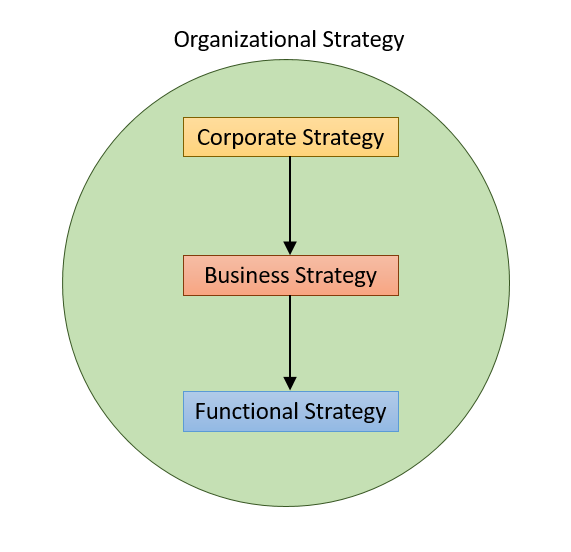By Bond Collective Staff
Whether you run a one-person startup out of your basement or a 500-person corporation with offices on both coasts, you need a business strategy. Without one, you’re setting your company up to fail.
As vital for success as business strategy is, many owners, managers, and entrepreneurs lack a firm grasp on the ins and outs of these guiding principles. In this article, we’ll help you understand business strategy, why it’s a key component of your success, and how to build one of your own.
What Is Business Strategy?
Business strategy (a.k.a. business level strategy) is a component of the much larger organizational strategy that governs all of your company’s activities.
Visualize it this way:
Organizational strategy is a plan that specifies how your business will allocate resources like money, labor, and inventory in order to support infrastructure, production, marketing, and other business activities.
Corporate strategy is the main purpose of your business. Think of it as the destination toward which your business is moving. That destination influences all the decisions you make in the other parts of your business.
Business strategy translates the corporate strategy into actionable goals. It’s the how to the corporate strategy’s what.
Functional strategy is the specific actions and benchmarks you assign to individuals or departments to support your business strategy.
When your business is new, your organizational strategy may be the same as your functional strategy. But as your business grows, you’ll start to add new layers of strategy (business on top of functional, corporate on top of business) until your organizational strategy is vastly different from your functional strategy.
Think of these different levels like a car. The functional strategy is the wheels — it’s where the rubber meets the road, so to speak. The corporate strategy is the engine — it provides the power and the drive.
And finally, the business strategy is the differential — it bridges the gap between corporate strategy and functional strategy and translates drive into actual movement.
Why Is Business Strategy Crucial?
At the most basic — and regardless of the size of your business — you need at least two strategies at all times:
-
Business strategy
-
Functional strategy
Business strategy gives you the what (e.g., improve quality) that translates into specific actions at the functional level (e.g., redesign the product to make it easier to produce). Even at the startup level, business strategy is essential for providing direction and purpose.
But the crucial nature of business strategy doesn’t stop there. Here are three more reasons why your company absolutely needs a business strategy.
1) Priorities
Direction is a large part of what a business strategy does. But it’s not the only part. Yes, you need to know which way to move and what to work on, but you also need to know when to perform these activities.
Your business strategy will set these priorities and tell everyone what they should do first, second, third, and fourth in order to move your company toward a specific goal.
2) Decision Making
Your business strategy also clarifies and simplifies the decision-making process. When you have a direction and know the order of steps to take to get there (your priorities), your decisions become more obvious and are easier to make.
For example, if your corporate strategy is to increase year-end profits by 5 percent but you look at the market and see that you’ve already reached saturation, your choices are limited. You’re going to need to diversify.
From there, you can set your business strategy at penetrating new markets. This, then, informs what each department or individual in your company needs to do: find new markets for your product or service.
3) Adaptation
If you’re riding a train to work one morning and the train breaks down in the station, do you give up and go home? No. You find another train (or take a bus or drive or walk) to get you to your destination.
In the business world, your business strategy is that destination. If problems arise along the way (which they will), you adapt in order to continue progressing toward your ultimate goal. That may mean finding alternative solutions or even going back to the drawing board.
Whatever the adaptation may be, it should continue moving your company toward the destination set out in your business strategy.
7 Tips For Building A Winning Business Strategy
1) Be Realistic
When you sit down to hammer out your business strategy, do your best to keep it realistic. Going from $50,000 in profit to $200,000 in profit from one year to the next may seem like a great idea, but is it realistic at this time? Maybe a profit of $60,000 or $75,000 would be a better goal.
2) Make It Measurable
Saying you want to improve your product is fine but is not measurable. All business strategies should have some type of quantitative value assigned to them.
If improving your product is the goal, rephrase the statement to something like restrict faulty product to 10% of the total. That’s a measurable business strategy.
3) Be Specific
Instead of setting your strategy as being the best in the business, be as specific as possible. This specificity often encompasses the measurability mentioned above.
With this in mind, a better business strategy would be to hold a 60-percent market share among all direct competitors.
4) Set Limits
When creating your business strategies, attach a deadline to each one. This will dictate what you do first, second, and third and how quickly you’ll need to complete each step. Don’t leave your strategies open-ended or you risk losing momentum.
5) Ensure That Everyone Is Working Toward The Same Goal
Your business strategy should provide direction to all departments and individuals in your company.
When you first open your doors, it may be the only guide you have. Eventually, you’ll grow enough that it acts as an intermediary between the more general corporate strategy and the very specific functional strategy.
Without a business strategy to show the way, it’s all too easy for a department or individual to get off track and start moving toward a different goal.
6) Coordinate Departments And Individuals
Business strategies are all about bringing everyone together — from owners and managers to individuals and teams — and coordinating their activities for a single purpose. This helps to promote teamwork at every level of your business.
7) Strengthen Specific Skills In Each Department
When crafting your business strategy, be sure to designate who does what. Whether that is an individual or an entire department, your business strategy should delineate a clear separation of responsibilities.
Without this key component, you may find your advertising department doing the work of the coding department. This is an inefficient (and potentially detrimental) allocation of skills. Advertising professionals likely don’t have the coding skills to do the job right the first time.
Even if they do, it’s better to let them focus on performing one activity well rather than two activities poorly.
Don’t Let Where You Work Dictate Your Business Strategy
Too often, new entrepreneurs allow their work environment to dictate their business strategy. Because they’re short on funds or have cash tied up in more essential areas, they may set part of their business strategy to improve infrastructure (e.g., furniture, heating and cooling, supplies, etc.). This is a mistake.
Business strategy should be about moving the business toward success, not about the comfort and focus of your team. The latter is more of a functional strategy that is the concern of your HR department (or individual).
The easiest way to give your team the infrastructure they need to stay focused, be comfortable while they work, and succeed at their tasks is to work in a shared office space, like those offered by Bond Collective.
At Bond Collective, you’ll enjoy:
-
State-of-the-art heating and cooling
-
Insanely fast Wi-Fi
-
Private meeting and phone booths
-
Concession food market
-
Complimentary beer, coffee, and tea
-
Complimentary fresh fruit
-
Private-label mail service
-
Daily on-site cleaning
-
Custom build-outs
-
Guest reception and greeting
-
24-hour access
-
Bike storage
-
And much more…
Tour our gorgeous office spaces in New York (Bushwick, 55 Broadway, 60 Broad, Gowanus, Flatiron) and Philadelphia (The Station House) to experience the best that modern office spaces have to offer. Then become a member of Bond Collective and take advantage of our coworking spaces, dedicated desks, and private offices to suit all your business needs.
To get started or to learn more about the advantages of coworking spaces for digital nomads, remote workers, and businesses of all kinds, visit BondCollective.com today.









